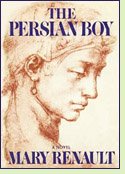The Persian Boy
by Mary Renault
Reviewed by David Maclaine

In The Persian Boy Mary Renault spins out a rich, believable account of Alexander the Great's later life, from his defeat of Darius to his early death in Babylon. The novel shows Alexander from the perspective of the Persian eunuch Bagoas, named by historians as the Macedonian conqueror's lover. He is a youth robbed by betrayal and capture of his prospect for manhood, groomed because of his beauty for the bed of the Great King Darius. Once a slave regarded as no more than one of the Persian king's many exquisite possessions, Bagoas soon finds himself lover and beloved of the brilliant young man who has toppled his former master. Through his eyes, with their distinctly Persian bias, we follow Alexander as he leads his armies through a series of hard campaigns in Bactria and beyond to India. Beside him, Bagoas faces conspiracy, mutiny, and the dire hardship of a long desert march.
Because the narrator's personal tragedy has barred him from training as a soldier, the novel's focus is less on the many battles fought along the way - although these are treated with Renault's usual care - than on the qualities that made Alexander a leader of men, and the mounting toll on body and spirit of a life lived on a sword's edge. Bagoas eventually understands that his two potential rivals for the king's physical affection, his long-time companion Hephaistion and his young bride Roxanne, are not his most serious competitors. That place is held by Alexander's army, whose love for their brilliant commander is pushed to the brink by his unquenchable desire for glory. That passion drives them ruthlessly toward the ends of the earth. The fictional texture of The Persian Boy is woven around historical events far more fantastic than any careful writer would dare invent. The novel succeeds in breathing fresh, aching life into the man behind some of the most astonishing accomplishments in human history. (1972, 419 pages)
More about The Persian Boy at Powell's Books, Amazon.comThe Persian Boy appears on the list of The 36 Best Historical Novels for a Survey of Ancient Greek History
Other novels about Alexander the Great:
God of War by Christian Cameron (2012), about Alexander from the perspective of his boyhood friend Ptolemy. See review or more info at The Book Depository
Alexander and Alestria by Shan Sa (2008), a novel about Alexander the Great which imagines him having a love affair with an Amazon queen from the eastern steppe country. More info
The Virtues of War by Steven Pressfield (1972), about the early years and military victories of Alexander the Great. See review or more info at Powell's Books
Nonfiction about Alexander the Great:
The Life of Alexander the Great by Plutarch (probably written in the late first century). More info
Alexander the Great by Philip Freeman (2011). More info
Alexander the Great by Robin Lane Fox (1974). More info
At the Movies:
Alexander, Revisited: The Final Cut
Online:
Alexander the Great at HistoryofMacedonia.org
Back to Novels of Ancient History
Back to Directory of Book Reviews